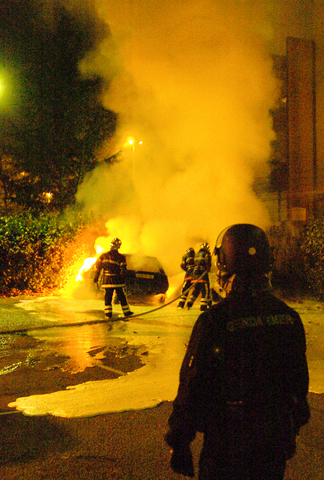The French government yesterday approved an extension of emergency powers for three months in order to subdue a wave of rioting in poor city suburbs around the country.
Meeting under the chairmanship of President Jacques Chirac, the Cabinet agreed on a bill to maintain the state of emergency which came into effect last Wednesday under a 50-year-old law. The bill will be put to parliament today.
Chirac said the extension was "a strictly temporary measure which will be applied only where it is strictly necessary," according to government spokesman Jean-Francois Cope.

PHOTO: AP
The state of emergency applies in most of the country's riot-hit towns and cities, but has been invoked sparingly by the authorities.
Some 30 localities are under nightly curfews for under 16-year-olds, and two temporary bans on public gatherings have been imposed in Paris and Lyon.
Chirac was to deliver a televised address to the nation yesterday evening on the subject of the suburban riots of the last two and a half weeks. The president, who has only spoken twice in public since the start of the trouble on Oct. 27, has been criticized for not appearing to take a lead role in defusing the crisis.
Figures from Sunday night indicated that the trouble is continuing to subside. Despite a marked decrease in unrest, the Cabinet proposed a bill yesterday allowing a 12-day state of emergency to be prolonged until mid-February, Cope said.
The measure empowers regions to impose curfews and conduct house searches. Cope said the bill, which must be approved by parliament, would leave open the possibility of ending the state of emergency before three months are up, if order is restored.
Overnight, the number of car-torchings -- a barometer of the unrest -- dropped dramatically, with youths setting fire to 284 vehicles, compared to 374 the previous night, police said yesterday. The unrest has decreased steadily since France declared a state of emergency on Wednesday.
"The lull is confirmed," national police spokesman Patrick Hamon said. A week ago, 1,400 cars were incinerated in a single night.
The 18 nights of arson attacks and riots -- set off by the accidental electrocution deaths of two teens who thought police were chasing them -- began in Paris' poor suburbs, where many immigrants from North and West Africa live with their French-born children in high-rise housing projects.
France's worst unrest since the 1968 student-worker protests is forcing the country to confront decades of simmering anger over racial discrimination, crowded housing and unemployment.
In scattered attacks overnight Sunday-Monday, vandals in the southern city of Toulouse rammed a car into a primary school before setting the building on fire.
In northern France, arsonists set fire to a sports center in the suburb of Faches-Thumesnil and a school in the town of Halluin.
A gas canister exploded inside a burning garbage can in the Alpine city of Grenoble, injuring two police officers, with three other officers were injured elsewhere.
In the next few days, France is expected to start deporting foreigners implicated in the violence -- a plan by law-and-order Interior Minister Nicolas Sarkozy that has caused divisions in the government.

PRECARIOUS RELATIONS: Commentators in Saudi Arabia accuse the UAE of growing too bold, backing forces at odds with Saudi interests in various conflicts A Saudi Arabian media campaign targeting the United Arab Emirates (UAE) has deepened the Gulf’s worst row in years, stoking fears of a damaging fall-out in the financial heart of the Middle East. Fiery accusations of rights abuses and betrayal have circulated for weeks in state-run and social media after a brief conflict in Yemen, where Saudi airstrikes quelled an offensive by UAE-backed separatists. The United Arab Emirates is “investing in chaos and supporting secessionists” from Libya to Yemen and the Horn of Africa, Saudi Arabia’s al-Ekhbariya TV charged in a report this week. Such invective has been unheard of

‘TERRORIST ATTACK’: The convoy of Brigadier General Hamdi Shukri resulted in the ‘martyrdom of five of our armed forces,’ the Presidential Leadership Council said A blast targeting the convoy of a Saudi Arabian-backed armed group killed five in Yemen’s southern city of Aden and injured the commander of the government-allied unit, officials said on Wednesday. “The treacherous terrorist attack targeting the convoy of Brigadier General Hamdi Shukri, commander of the Second Giants Brigade, resulted in the martyrdom of five of our armed forces heroes and the injury of three others,” Yemen’s Saudi Arabia-backed Presidential Leadership Council said in a statement published by Yemeni news agency Saba. A security source told reporters that a car bomb on the side of the road in the Ja’awla area in

US President Donald Trump on Saturday warned Canada that if it concludes a trade deal with China, he would impose a 100 percent tariff on all goods coming over the border. Relations between the US and its northern neighbor have been rocky since Trump returned to the White House a year ago, with spats over trade and Canadian Prime Minister Mark Carney decrying a “rupture” in the US-led global order. During a visit to Beijing earlier this month, Carney hailed a “new strategic partnership” with China that resulted in a “preliminary, but landmark trade agreement” to reduce tariffs — but

SCAM CLAMPDOWN: About 130 South Korean scam suspects have been sent home since October last year, and 60 more are still waiting for repatriation Dozens of South Koreans allegedly involved in online scams in Cambodia were yesterday returned to South Korea to face investigations in what was the largest group repatriation of Korean criminal suspects from abroad. The 73 South Korean suspects allegedly scammed fellow Koreans out of 48.6 billion won (US$33 million), South Korea said. Upon arrival in South Korea’s Incheon International Airport aboard a chartered plane, the suspects — 65 men and eight women — were sent to police stations. Local TV footage showed the suspects, in handcuffs and wearing masks, being escorted by police officers and boarding buses. They were among about 260 South